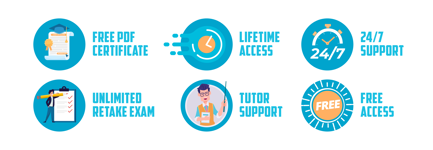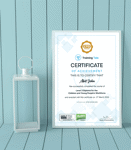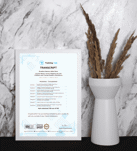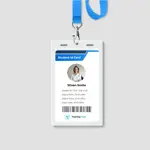Medical Receptionist - Essential Skills
Spring Sale | 3 Courses Mega Bundle | 3 Free PDF Certificates | Unlimited Retake | Lifetime Access
Training Tale
Summary
- Certificate of completion - Free
- Exam(s) / assessment(s) is included in price
- Tutor is available to students
Add to basket or enquire
Overview
A medical secretary is responsible for ensuring that a doctor’s office runs smoothly so that patients receive the best possible care. A medical secretary must understand office organisation and standard procedures to provide this secretarial support. They should also be able to use medical terminologies fluently. This Medical Receptionist - Essential Skills course will teach you about the medical secretarial profession and the skills needed to do the job successfully.
This course will teach you about the roles and responsibilities of a medical secretary. You will also learn various medical secretary skills, including an effective filing system, medical transcription, medical writing, maintaining medical records, an appointment system, and more. Furthermore, this comprehensive Medical Receptionist - Essential Skills course will teach you the critical concepts of patient confidentiality and other legal aspects of the healthcare industry.
Learning Outcomes
After completing this Medical Receptionist - Essential Skills course, learner will be able to:
- Understand the fundamentals of the National Health Service.
- Understand the roles and responsibilities of a medical secretary.
- Know how to organise schedules and manage appointment systems.
- Gain a clear understanding of the Law, Ethics and Medicine.
- Gain a thorough understanding of the effective filing system in medical offices.
- Familiarise yourself with the concept of patient confidentiality and its dos and don’ts.
- Become skilled at controlling and ordering stocks and supplies.
- Gain in-depth knowledge of Medical Terminology and Clinical Aspects.
- Know the importance of health and safety in the healthcare sector.
- Have a solid understanding of Complementary Medicine
Why Choose Medical Receptionist Skills Course from Us
- Self-paced course, access available from anywhere.
- Easy to understand, high-quality study materials.
- Medical Receptionist - Essential Skills Course developed by industry experts.
- MCQ quiz after each module to assess your learning.
- Automated and instant assessment results.
- 24/7 support via live chat, phone call or email.
- Free PDF certificate as soon as completing the Medical Receptionist - Essential Skills course.
**Courses are included in this Medical Receptionist - Essential Skills Bundle Course
- Course 01: Medical Receptionist - Essential Skills
- Course 02: Workplace Stress Management
- Course 03: Anger Management
***Others Included of Medical Receptionist - Essential Skills Bundle Course
- Free 3 PDF Certificate
- Access to Content - Lifetime
- Exam Fee - Totally Free
- Free Retake Exam
[ Note: Free PDF certificate as soon as completing the course ]
Course media
Description
Detailed course curriculum of the Medical Receptionist - Essential Skills Course:
Module 1: The National Health Service
- History
- Structure of the NHS
- The NHS Plan
- Resource Allocation
- Delivering Care
- Mental Health Services
- Public Health
- The NHS, the Regions and Devolution
Module 2: Patient (Customer) Care
- The Medical Receptionist
- Putting Patient First
- Complaints Within the Health Service
- The Complaints Procedure
- Patient and Public Involvement
- Patient’s Rights
- Access to Health Care
- Total Quality in Medical Practice
- Customer Care: Involving Patients and the Public
Module 3: Communication
- Report Writing
- Electronic Mail & Mobile Phones: Text Messages
- Telephone Skills
- People Skills – Face to Face
- Meeting
- Performance Review & Counselling
- The Practice Leaflet & Hospital Information Leaflets
- Networking
Module 4: Law, Ethics and Medicine
- Medical Ethics and Etiquette
- Doctor’s Duties
- Patient’s Right
- The Regulatory Bodies and Their Role
- Legal Aspects
- Certification
- Health and Safety at Work
Module 5: Health & Safety in a Clinical Environment
- First Aid at Work
- Hazardous Substances
- The NHS National Patient Safety Agency (NPSA)
- Hepatitis & AIDS
- Fire Precautions
- Clinical Risk Management
- Coping With Aggression & Violence
Module 6: Practical Reception Skills in General Practice
- Record Keeping and General Administration
- Information Technology
Module 7: The Hospital Service
- The Patient’s Route Through the Hospital
- Outpatient Appointments
- Admissions from the Waiting List
- Accident and Emergency Admissions
- Home From Hospital Support
- Day Cases and Ward Attendees
- Hospital Team
- Clinical Audit
- Star Ratings
- What is a Medical Record?
- Cases Notes
- Master Index
- Filing Room or Records Library
- Medical Records Procedure for Departments
- Retention of Records
- Destruction of Medical Records
- The Role of the Secretary in the Hospital
Module 8: Private Medicine
- Private Clinic or Hospital
- The Secretary In Private Practice
Module 9: Forms, Fees and Finances in General Practises
- Contracting
- Finance
- Practice Income
- Scotland
- Wales
- Northern Ireland
Module 10: Using Information Technology
- Computers in General Practice
- Electronic Medicine
- Computers in Hospitals
- Maintaining Security
Module 11: Medical Terminology and Clinical Aspects
- Pathology and X-ray Examinations
- Prescribing and Drugs
- Nurse Prescribing
- New Developments in Pharmacy
Module 12: Audit, Health Economics and Ensuring Quality for the Medical Receptionist and Secretary
- Audit
- Health Economics and Cost-effective Medicine
- Private Finance Initiative
- Clinical Governance
- National Institute for Clinical Excellence (NICE)
- National Clinical Assessment Service (NCAS)
- National Service Framework (NSF)
- Patient Surveys
Module 13: Complementary Medicine
- Acupuncture
- Alexander Technique
- Aromatherapy
- Chiropractic
- Homoeopathy
- Hydrotherapy
- Hypnotherapy
- Osteopathy
- Reflexology
-------------------
***Workplace Stress Management***
- Module 01: Workplace Stress
- Module 02: Rational and Irrational Beliefs
- Module 03: The ABC Framework of REBT
- Module 04: Cognitive Therapy (CT)
- Module 05: Cognitive Behavioural Therapy (CBT) in the Workplace
- Module 06: Conclusion
-------------------
***Anger Management***
- Module 01: Introduction to Anger
- Module 02: The Process in Anger
- Module 03: Effect of Anger on Our Thinking
- Module 04: How to Manage Anger
------------------
Assessment Method
After completing each module of the Medical Receptionist - Essential Skills, you will find automated MCQ quizzes. To unlock the next module, you need to complete the quiz task and get at least 60% marks. Once you complete all the modules in this manner, you will be qualified to request your certification.
Certification
After completing the MCQ/Assignment assessment for this Medical Receptionist - Essential Skills course, you will be entitled to a Certificate of Completion from Training Tale. It will act as proof of your extensive professional development. The certificate is in PDF format, which is completely free to download. A printed version is also available upon request. It will also be sent to you through a courier for £13.99.
Who is this course for?
This Medical Receptionist - Essential Skills course is ideal for Health Care Professionals who work and will be working in healthcare settings such as hospitals, clinics, and healthcare facilities.
Requirements
There are no specific requirements for this Medical Receptionist - Essential Skills course because it does not require any advanced knowledge or skills.
Career path
After completing this course, you will have developed a set of skills necessary for career advancement and will be able to pursue a variety of job opportunities, including —
- Medical Receptionist
- Medical Secretary
- Healthcare Administrator
- GP Receptionist
- Patient Coordinator
Questions and answers
Currently there are no Q&As for this course. Be the first to ask a question.
Certificates
Certificate of completion
Digital certificate - Included
Reviews
Currently there are no reviews for this course. Be the first to leave a review.
Legal information
This course is advertised on reed.co.uk by the Course Provider, whose terms and conditions apply. Purchases are made directly from the Course Provider, and as such, content and materials are supplied by the Course Provider directly. Reed is acting as agent and not reseller in relation to this course. Reed's only responsibility is to facilitate your payment for the course. It is your responsibility to review and agree to the Course Provider's terms and conditions and satisfy yourself as to the suitability of the course you intend to purchase. Reed will not have any responsibility for the content of the course and/or associated materials.






